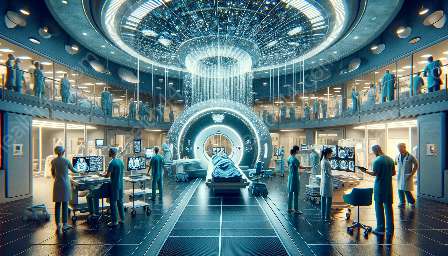Magnetic Resonance Imaging (MRI) has revolutionized the field of medical imaging and has significant implications in assessing and monitoring response to therapy. This advanced technology provides detailed and accurate insights into the human body's internal structures, allowing healthcare professionals to more effectively evaluate treatment outcomes and make informed decisions. In this article, we will explore the role of MRI technology in assessing and monitoring response to therapy and its impact on medical imaging.
Understanding MRI Technology
MRI is a non-invasive imaging technique that uses a strong magnetic field and radio waves to produce detailed images of the body's internal organs and tissues. Unlike X-rays or CT scans, MRI does not use ionizing radiation, making it a safer option for imaging procedures. The high-resolution images generated by MRI provide valuable information about the anatomical and functional characteristics of the human body, making it an essential tool for diagnosing and monitoring various medical conditions.
Assessing Treatment Response with MRI
One of the key implications of MRI technology is its ability to assess treatment response in patients undergoing therapy for various medical conditions. By conducting MRI scans before, during, and after a course of treatment, healthcare professionals can evaluate the effectiveness of the therapy and make necessary adjustments based on the observed changes in the images. For example, in oncology, MRI is used to monitor tumor size and response to chemotherapy, allowing oncologists to tailor treatment plans for individual patients.
Monitoring Disease Progression
In addition to assessing treatment response, MRI plays a crucial role in monitoring the progression of diseases such as multiple sclerosis, Alzheimer's disease, and cardiovascular conditions. The ability of MRI to visualize pathological changes in the brain, heart, and other organs enables early detection of disease progression, facilitating prompt intervention and management. Regular MRI monitoring allows healthcare providers to track changes in disease severity and adjust treatment strategies accordingly.
Quantifying Therapy Outcomes
The quantitative nature of MRI imaging allows for the precise measurement of treatment outcomes. By analyzing parameters such as tissue volume, perfusion, and diffusion, healthcare professionals can quantitatively evaluate the response to therapy, providing objective data to support clinical decision-making. This quantitative assessment is particularly valuable in the field of neurology, where subtle changes in the brain's structure and function can be accurately measured using MRI techniques.
Enhancing Personalized Medicine
MRI technology contributes to the advancement of personalized medicine by providing detailed information about an individual's physiological characteristics and treatment response. The ability to perform functional MRI (fMRI) and diffusion tensor imaging (DTI) allows healthcare professionals to assess the functional connectivity and integrity of neural pathways, aiding in the personalized management of neurological and psychiatric conditions. With the wealth of data produced by MRI, clinicians can tailor treatment regimens to match the specific needs of each patient, optimizing therapeutic outcomes.
Impact on Medical Imaging
The implications of MRI technology extend beyond individual patient care and have a profound impact on the field of medical imaging as a whole. The use of MRI in assessing and monitoring response to therapy has led to the development of advanced imaging techniques and software tools aimed at quantifying treatment effects and analyzing complex imaging data. This has spurred innovation in medical imaging technology, paving the way for the integration of artificial intelligence and machine learning algorithms in MRI analysis, further enhancing the ability to assess treatment response and predict patient outcomes.
Conclusion
In conclusion, MRI technology has far-reaching implications in assessing and monitoring response to therapy, offering healthcare professionals a powerful tool for evaluating treatment effectiveness and disease progression. With its ability to provide detailed anatomical and functional information, MRI plays a crucial role in guiding therapeutic decisions and advancing personalized medicine. As medical imaging continues to evolve, the integration of MRI technology with innovative computing methods holds promise for enhancing the accuracy and efficiency of treatment response assessment, ultimately leading to improved patient care and outcomes.



